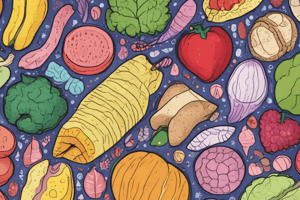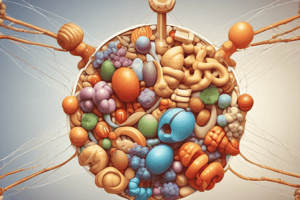Podcast
Questions and Answers
Which type of carbohydrate is formed when two monosaccharides bond together?
Which type of carbohydrate is formed when two monosaccharides bond together?
- Disaccharides (correct)
- Polysaccharides
- Complex carbohydrates
- Monosaccharides
Which of the following is NOT an example of a disaccharide?
Which of the following is NOT an example of a disaccharide?
- Fructose (correct)
- Sucrose
- Maltose
- Lactose
What is the main function of polysaccharides in living organisms?
What is the main function of polysaccharides in living organisms?
- Facilitate nerve transmission
- Provide quick energy
- Act as structural components (correct)
- Assist in oxygen transport
Which type of carbohydrate takes longer to digest and has a more gradual effect on blood sugar levels?
Which type of carbohydrate takes longer to digest and has a more gradual effect on blood sugar levels?
What does the glycemic index measure in relation to carbohydrates?
What does the glycemic index measure in relation to carbohydrates?
Which of the following is NOT an example of a complex carbohydrate?
Which of the following is NOT an example of a complex carbohydrate?
What type of carbohydrates are chains of monosaccharides connected through glycosidic bonds?
What type of carbohydrates are chains of monosaccharides connected through glycosidic bonds?
Which type of carbohydrate can cause a rapid rise in blood sugar due to being quickly absorbed?
Which type of carbohydrate can cause a rapid rise in blood sugar due to being quickly absorbed?
What factor can affect the glycemic index of a food?
What factor can affect the glycemic index of a food?
Which type of carbohydrates contain a double-bonded carbon and oxygen atom with two additional carbon atoms?
Which type of carbohydrates contain a double-bonded carbon and oxygen atom with two additional carbon atoms?
What do carbohydrates provide for the body?
What do carbohydrates provide for the body?
Which carbohydrates are classified based on their chemical structure as aldehydes or ketones?
Which carbohydrates are classified based on their chemical structure as aldehydes or ketones?
Flashcards are hidden until you start studying
Study Notes
Carbohydrates: A Comprehensive Guide
Background
Carbohydrates, also known as saccharides or carbs, are one of the three main macronutrients in the human diet, alongside proteins and fats. They provide energy for the body by breaking down into glucose, which is used by the brain and muscles. Carbohydrates occur mainly in plant foods but also in dairy products as milk sugar (lactose).
Types of Carbohydrates
Monosaccharides
Monosaccharides, or simple sugars, are the basic units of carbohydrates. They have a simple chemical structure and are the building blocks for more complex carbohydrates. Examples include glucose, galactose, and fructose.
Disaccharides
Disaccharides are formed when two monosaccharides bond together, eliminating a water molecule. Examples include lactose (found in milk) and sucrose (table sugar).
Polysaccharides
Polysaccharides are made up of long chains of monosaccharides. They play a significant role in energy storage and act as structural components in plants and animals. Examples include glycogen in animals and starch in plants.
Complex Carbohydrates
Complex carbohydrates, also known as polysaccharides, consist of three or more monosaccharides bonded together. They take longer to digest and have a more gradual effect on blood sugar levels. Examples include cellobiose, rutinulose, amylose, cellulose, dextrin, and glycogen.
Glycemic Index
The glycemic index is a measure of how quickly and how much carbohydrates raise blood sugar levels. Foods with a high glycemic index are quickly absorbed and can cause a rapid rise in blood sugar, while foods with a low glycemic index are slowly absorbed and cause a more gradual rise in blood sugar. Factors affecting the glycemic index include the type of carbohydrate, its ripeness, and the presence of fat or protein in the food.
Chemistry of Carbohydrates
Carbohydrates are organic compounds containing carbon, hydrogen, and oxygen atoms. They can be classified as aldehydes, ketones, or polymers (oligomers or polymers) based on their chemical structure. Aldehydes have a double-bonded carbon and oxygen atom with a hydrogen atom attached, while ketones have a double-bonded carbon and oxygen atom with two additional carbon atoms. Carbohydrates can combine to form polymers, such as polysaccharides, which are chains of monosaccharides connected through glycosidic bonds.
In conclusion, carbohydrates play a crucial role in providing energy for the body and have various types and structures, including monosaccharides, disaccharides, polysaccharides, complex carbohydrates, and polymers. Understanding these different forms of carbohydrates is essential for maintaining a balanced diet and understanding their effects on health and metabolism.
Studying That Suits You
Use AI to generate personalized quizzes and flashcards to suit your learning preferences.




